| Chapter V. My Betrothal And Marriage | Title page | Chapter VII. The Death of Mirza Hasan Khan, Mustaufi |
[ p. 83 ]

Although we stand abashed in the presence of the noble,
It matters not, since we have drawn nourishment from this earth and water;
On the face of the earth, there is no place like Kerman;
Kerman is the heart of the world, and we are men of heart.
Shah Namat Ullah.
The origin of Kerman is famous throughout the Seven Climates, if only on account of the world-renowned legend connected with it, which I will here repeat.
In the days of Ardeshir, son of Babek, who lived many centuries before our Prophet, on him and on his descendants be peace, a maiden was spinning with her companions in a garden when she picked up an apple, within which she found a kerm or worm.
She, half in jest, vowed that if she completed her allotted task before her companions, she would cherish the worm and feed it daily. Almost at once her spinning was completed, and [84] from that day her father’s family increased in prosperity until they conquered the province, which was thenceforward known by its name of Kerman or the “Worm Province.”
Ardeshir, monarch of Iran, suffered defeat after defeat at the hands of Haftan Bokht, the father of the girl, until he realised that so long as the Worm was alive he was powerless.
Consequently he resolved on a daring stratagem, and, disguising himself as a merchant prince, he presented himself before Haftan Bokht and said, that as he owed all his success in trade to the good fortune of the Worm, he requested the honour of feeding it for three days. This petition was readily granted, and as Firdausi, the greatest epic poet of all the cycles of time, writes:
When their souls were deep steeped in the wine-cup;
Forth fared the Prince with his hosts of the hamlet,
Brought with him copper and brazen cauldron,
Kindled a flaming fire in the white daylight.
So to the Worm at its meal-time was measured
In place of milk and rice much molten metal.
Unto its trench he brought that liquid copper;
Soft from the trench its head the Worm upraised.
Then they beheld its tongue, like brazen cymbal,
Thrust forth to take its food as was its custom.
Into its open jaws that molten metal
Poured he, while, in the trench, helpless the Worm writhed;
Crashed from its throat the sound of fierce explosion,
Such that the trench and whole fort fell a-quaking.
Swift as the wind Ardeshir and his comrades [p. 85 ]
Hastened with drawn swords, arrows, and maces.
Of the Worm’s warders, wrapped in their wine-sleep,
Not one escaped alive from their fierce onslaught.
Then from the Castle-keep raised he the smoke-wreaths
Which his success should tell to his captains.
Hasting to Shahr-gir swift came the sentry,
Crying, “King Ardeshir his task hath finished!”
Quickly the captain then came with his squadrons,
Leading his mail-clad men unto the King’s aid.
I think, O wise men of the Seven Climates, that you will agree that the origin of Kerman is out of the common, and that the city founded by Ardeshir is no ordinary city. He it was who constructed the great ditch and also the two awesome forts, reaching to the clouds, and the stronger and higher of these great fortresses still bears his name; the other is known as the “Virgin’s Fort,” and has never been polluted by a conqueror’s triumph.
But to-day, thanks to the might of the Kajar dynasty, these forts are in ruins, as peace reigns everywhere, and the city of Kerman, which bears the illustrious title of “Abode of Safety,” stretches far and wide at their feet. Not that there are no walls round the city, that would be folly; but Kerman is built on a perfect plan and has great squares, peerless mosques, and superb colleges, that make it the envy of all other cities in Persia.
The palace, too, is so magnificent that travellers consider its “Hall of Audience” to [86] be a rival to that at the capital, but Allah knows if this be true.
No account, however, of the residence of the Governor-General would be complete without a reference to the Drum House. From the days of Jamshid, [1] who built the palaces still called by
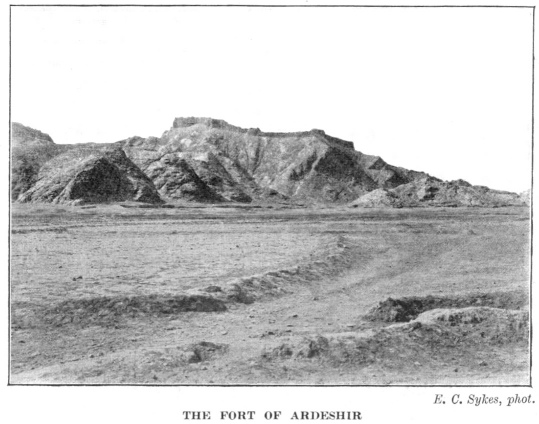
E. C. Sykes, phot.
his name near Shiraz, every great city has enjoyed the privilege of hearing music, which is played from a gateway to usher in the rising sun and to play out the setting sun. Indeed, it is evident that this music is of great antiquity. The instruments consist of kettledrums of a large size, pipes, and long trumpets quite six feet long. Whenever I hear the music I feel proud that I am an Irani, whose history goes back to the days when the sun was worshipped; and even Farangis acknowledge that they have never heard any music like that of the Drum House.
[ p. 87 ]
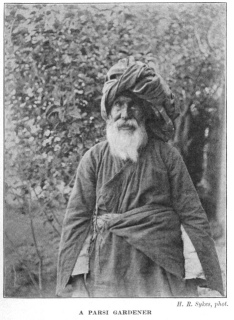
H. R. Sykes, phot.
[ p. 88 ]
[ p. 89 ]
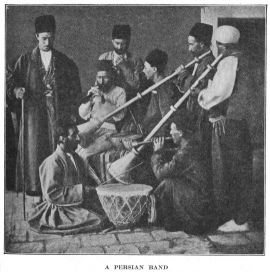
Our city, compared to which Shiraz is little more than a village, is surrounded by lovely gardens, many of which are owned by the Gabrs, [2] [ p. 90 ] who, although despised by all Mussulmans, are yet the best gardeners in Persia; and, after all, they are our own stock and they swear that Hazrat Ibrahim was their Prophet.
Kerman is famous for its shawls, which rival those of Kashmir, and for its carpets, which are unrivalled in the world. They say that it is the wonderful climate of the province which produces wool of such exquisite fineness; and yet, without the hereditary skill of the Kermanis, of what use would these advantages prove? Indeed, kings prize the output of the Kerman looms; and whenever a robe of honour is bestowed by the Shah, may Allah protect him! it is always a Kerman shawl of exquisite beauty and fineness. Indeed, the shawls of Kashmir, which also are very fine, are partly manufactured from Kerman wool, and so, in praising them, I also laud Kerman.
Not that the province is without natural products, as, among many other things which grow wild for any one to collect, are the delicious caraway seeds. Indeed, so famous are they that “To take caraway seeds to Kerman” has become a proverb.
The inhabitants of my city are noted for their hospitality, and there were frequent parties in the gardens with their red roses, leafy glades, and running streams; and we spent the summer day in reciting verses or discussing the history of glorious Iran. In the winter, too, the long evenings were spent most pleasantly, as Persians, and especially the Kermanis, have so keen a wit that it is impossible to tire of listening to its sallies. In short, I thanked Allah that I had become an inhabitant of such a famous city, where my learning and wit were so fully appreciated.
[ p. 91 ]
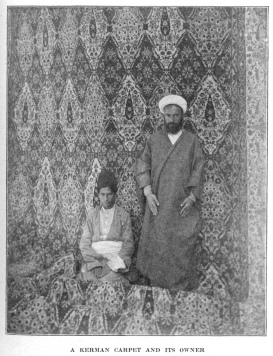
[ p. 92 ]
[ p. 93 ]
Owing to the fact that the Governor-General, the Vakil-ul-Mulk, may Allah keep cool his grave! had always considered my father as one of his own family, his son, who had now succeeded him, continued to treat me with equal kindness, and I gradually became his chief courtier, and so fond was he of history and poetry that, when he went into the mountains during the “Forty days of Heat,” he always took me in his service; and thus my position and wealth were increased. Indeed, I soon began to be employed on matters of importance, as will be shown later on.
I have not hitherto mentioned that in Kerman there lived an English doctor who, when he first came, was looked upon as a stranger; but, Allah knows, in surgery the English surpass even our best hakims, and, as Allah the Omnipotent used the Sahib as a medium to restore the sight of my uncle, who had a cataract in his left eye, I became a great [94] friend of his; and indeed it was he who suggested that the inhabitants of London and of the New World would like to read the story which is now being written.
In addition to a hospital, a school was opened by the English, and to it a few of the sons of the Khans were sent. The Vakil-ul-Mulk, whose grandfather had been the official entertainer of Sir John Malcolm, when that illustrious Englishman was appointed ambassador at the foot of the throne of Fath Ali Shah, was most kind to the English; and perhaps it is not known that once when a high official asked him to name what gift the British Government should offer him, he replied that he wished a Persian translation of the ambassador’s History of Persia to be made and presented to him.
I always consider that this action showed how noble was the character of the Vakil-ul-Mulk, and I shall never forget his reply to his Vizier who had represented that, in his opinion, a hundred rifles would have been a more useful gift. The Vakil-ul-Mulk simply replied, "Listen what Shaykh Sadi says:
“Sons of Adam from learning will find perfection,
Not from dignity, and rank, and wealth, and property;
Like a taper one must melt in pursuit of learning,
Since without learning one cannot know God.”
Now I do not want it thought that I who am, [ p. 95 ] Allah be praised, a pious Mussulman, am a lover of European ways. Far from it, I am no fool, and what I know, I know.
Once, our Governor-General sent one of his sons to Europe with plenty of money, and with instructions to study history, law, geography, all sciences and languages, and above all, Parliament. [3] Well, Fazal Ullah Khan spent several years and much money in London, and wrote to his father such accounts of his learning and of the attentions paid to him by its Viziers, who, according to him, vied with one another in honouring him, that the Governor-General was transported with delight, and frequently exclaimed in Durbar that, without the slightest doubt, Fazal Ullah Khan would, one day, be Grand Vizier of Persia, or, if not that, he would certainly become Vizier for Foreign Affairs.
At length Fazal Ullah Khan wrote to his father that he was returning to his service, and His Excellency, who was camping in the hills during the “Forty days of Heat,” gave orders for him to be met with the highest honours by all his servants, of whom I was one of the chief.
The reception party consisted of three hundred sowars under a general, but with the [ p. 96 ] Governor’s chief officer in supreme charge. There were also twenty mounted servants leading superb horses with collars of gold round their necks and gorgeous Resht saddle-cloths; and the Governor’s favourite horse was sent for Fazal Ullah Khan to ride upon. In truth, had he been a prince more honour would not have been shown him.
Near the camp, ten servants with silver maces and sixty farrashes led the future Vizier to where His Excellency awaited him alone. Fazal Ullah Khan flung himself off his horse and wished to do obeisance to his father; but the latter, kissing him on the mouth, led him by the hand to a tent which they entered alone.
After a short silence His Excellency said, “My son, during the course of your many years of travel, tell me what is the most extraordinary thing thou hast observed.” “Lord of my life,” was the reply, “may I be thy ransom; but, in London, even the little boys spoke the English tongue.”
The Governor made no reply, but rose and left the tent. He was immediately surrounded by the nobles of the province, who expressed hopes that he was satisfied with his son. The only reply I heard was, “My money has been burnt.”
That night this matter and nothing else was [97] under discussion, and I quoted the following verse:—
From the miracles of our spiritual Leader what a wonder!
The snow fell, and he stated “the snow is falling.”
Needless to say, none of us Kermanis have, since that date, thought of educating our sons in Europe; and surely we are wiser than the Tehranis, who are now constantly sending their sons to Paris and London. There is also the fear lest our youths might become enamoured of a Christian maiden and follow the evil example of Shaykh Sinan, who, in like case, deserted his band of disciples and grazed a herd of swine. As Sadi wrote:
I saw a holy man in a mountain,
Who, abandoning the world, took up his abode in a cave;
I asked him, “Why dost thou not visit the city
So that thou mightest distract thyself somewhat?”
He replied, “There are beauteous fairies there;
When there is much mud, the elephants slip.”
In short, whenever I pass the school which is held near my house and hear all the boys learning to recite our holy Koran, I exclaim, “Praise be to Allah, this is true education.” Moreover, if a boy complains to me of the severity of the teacher and the frequency with which punishment is inflicted, I reply, “Know, ‘O son,’ that a blow from the teacher’s rod is like a rose leaf.” Thus do I comfort scholars.
I have not hitherto referred fully to the [98] question of religion, and I do not expect that this work will move Christians to become true believers; but yet I know that there is much ignorance among them; and so it is right that I should lessen this by giving some account of our religion, and, to begin with, it is impossible to do better than to narrate the interview between the early refugees from Mecca and the Negus of Abyssinia.
Then the Negus sent unto the followers of the Apostle of Allah. So when they came to him, he inquired of them saying, “What is this religion, by reason of which ye have separated from your people, yet enter not withal into my religion, nor into the religion of any other of these churches?”
Then answered him Jafar, the son of Abu Talib (may the approval of Allah rest upon him!), saying, “O King! We were a barbarous folk, worshipping idols, eating carrion, committing shameful deeds, violating the ties of consanguinity, and evilly entreating our neighbours, the strong amongst us consuming the weak; and thus we continued until Allah sent unto us an Apostle from our midst, whose pedigree, and integrity, and faithfulness, and purity of life we knew, to summon us to Allah, that we should declare His unity, and worship Him, and put away the stones and idols which we and our fathers used to worship in His stead; and he bade us be truthful in speech, and faithful in the fulfilment of our trusts, and observing of the ties of consanguinity and the duties of neighbours, and to refrain from forbidden things and from blood; and he forbade us from immoral acts and deceitful words, and from consuming the property of orphans, and from slandering virtuous women; and he commanded us to worship Allah, and to associate naught else with Him, [99] and to pray, and give alms and fast.” Then the Negus wept and said to them, “Verily this and that which Moses brought emanate from one lamp.”
O men of Europe, surely it is wiser for us who are “People who possess a revealed Scripture” to agree with the Negus than to remain divided as if by a bottomless gulf.
To resume, it is, of course, known to the instructed that the Mussulmans in the world are divided into two great divisions and seventy-two subdivisions. The Persians term themselves Shias or “Separatists,” and the rest of the Mussulmans are, generally speaking, Sunnis or “Followers of the Traditions,” although there are many Shias in Hindustan and elsewhere.
We Shias consider that Hazrat Ali, on Him and on his family be Peace, was the true successor of the Prophet.
Ali is the pearl of the ocean of eternity;
Ali is the successor of Mohamed.
Consequently, the three caliphs who ruled before Ali came to his rights are considered to be usurpers by us; Omar, in particular, who conquered Persia, being especially accursed. It is also firmly believed that the last Imam is not dead, but hidden. Inshallah! I shall refer to this question again.
Apart from the great division between the Shias and Sunnis there are also minor divisions, [100] and, in Kerman, almost all the Khans belonged to the Shaykhi sect, and believed that at the resurrection men would only arise in the spirit and not in the flesh. Moreover, it was believed that there must always be a special channel of grace between the hidden Imam and his church. Haji Mohamed Kerim Khan of the Kajar family was the head of the Shaykhis when I first lived at Kerman; and, as my mother also belonged to the Kajar family, I was brought up to respect them.
Yet it is the Sufi creed which really attracted me, and which I have already referred to. Many are the hours I spent listening to the Murshid or Spiritual Head of the Mahun Shrine, and my heart approved when he repeated again and again that all religious fanaticism was the result of ignorance, and that it must be swept away to make place for universal love.
Do not listen to the strife amongst the seventy-two religions:
Not seeing the way of reality they have strayed into romance.
During the whole of his life he slept but four hours in the night, merely wrapping himself in his brown cloak, and lying down on the bare floor. Moreover, he strictly limited himself to the number of mouthfuls of food which he deemed actually necessary to sustain his slender frame.
He died while giving a lecture to his eager disciples on the love of Allah, murmuring ‘Hu, Hu, Hu.’ [4] In truth he was a holy man. May Allah forgive him!
[ p. 101 ]
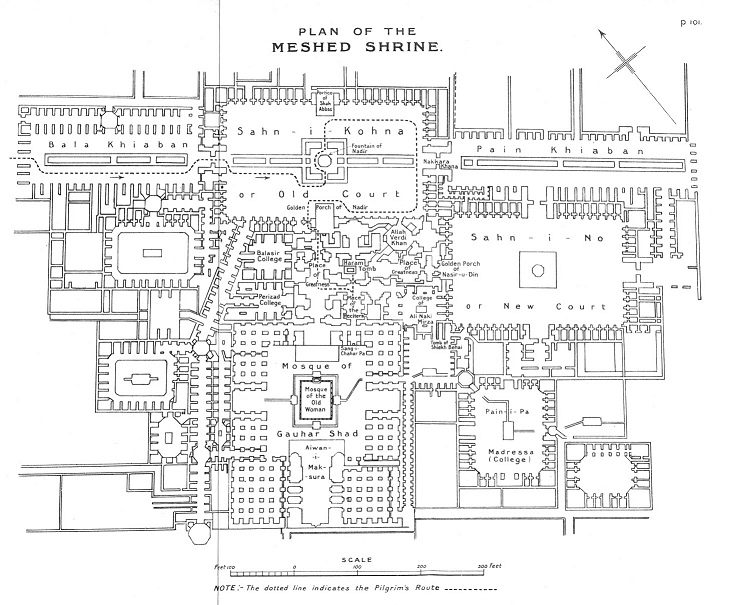
I have referred to this question, for Allah knows there be enough sinners among the Mussulmans; but they alone will travel for months across deserts, and bear heat and cold, hunger and thirst, which kills many among them. Yet on they press in thousands, and all in the hope that they may gaze on the tomb of the martyred Imam, the innocent Riza. On Him and on his family be Peace! To make this pilgrimage one day became, from this period, my fixed desire.
To conclude this chapter what better can I say than that—
Kerman is the heart of the world, and we are men of heart.
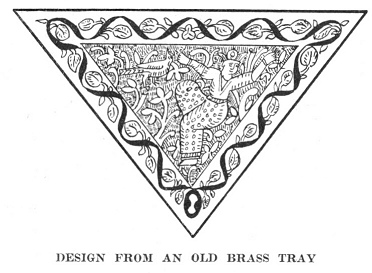
| Chapter V. My Betrothal And Marriage | Title page | Chapter VII. The Death of Mirza Hasan Khan, Mustaufi |
¶ Footnotes
86:1 Persepolis is termed “The Throne of Jamshid” by the Persians. ↩︎
89:1 The Gabrs, or Parsis, as we term them, sometimes identify Zoroaster with Abraham. As a matter of fact, when given a chance, as in India, they prove themselves to be a very fine race. In Persia, too, they are noted for their integrity. ↩︎
95:1 The strength of the British nation is held to be derived from this word, which was formerly believed to be magical. ↩︎
101:1 Sc. He, meaning thereby God. ↩︎